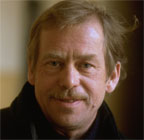Václav Havel, dissident, playwright, first president of the Czech Republic, and author of Charter 77 died today.
Republic, and author of Charter 77 died today.
Samuel Beckett wrote a play for Havel when he was in jail. On being freed, Havel returned the favour.
It was the making of a great dramatic double-act. In 2009, Index on Censorship editor Jo Glanville reflected on the relationship between the two
In 1982, Samuel Beckett dedicated a new play, Catastrophe, to Václav Havel, then a political prisoner in Czechoslovakia, serving a four and a half year sentence for “subversive activities”. He had been asked to write the play by the International Association for the Defence of Artists, who were organising a night of solidarity for the Czech playwright at the Avignon festival that summer. Although Beckett had never met Havel, he was concerned by the persecution of artists in eastern Europe and was horrified to hear that Havel had been forbidden to write in prison.
“The fact that Samuel Beckett made himself heard in this way pleased me immensely,” recalls Havel. “He was a father of modern theatre, who dwelt somewhere up in the heavens, isolated from the hubbub down below.” When Havel was released the following year, he returned the honour by dedicating a play, Mistake, to Beckett. It’s a little-known footnote to both writers’ careers. The plays were performed together in Stockholm in 1983 and first published in 1984 by the magazine Index on Censorship.
It was Havel’s friend František Janouch who first asked him to write a play when he came out of prison. Janouch, a nuclear physicist, had been granted political asylum in Sweden in 1974. He then founded the Charter 77 Foundation, to support the dissident movement back home. Havel, Janouch recalls, was initially reluctant to write: “I told him, ‘It will be a fantastic announcement that you are now free and you are the same Havel.’ I called a week after and he said, ‘Well, the piece is ready.'”
After Havel’s release, Janouch served as a go-between in an exchange of letters between Beckett and his fellow playwright. Havel thanked Beckett for dedicating Catastrophe to him. “For a long time afterwards,” he wrote, “there accompanied me in the prison a great joy and emotion, [helping] me to live on amid all the dirt and baseness.” According to James Knowlson, Beckett’s friend and biographer, Beckett was deeply touched: “He talked about the extraordinarily moving letter he’d had. He was very moved by Havel’s plight.”
Janouch then had a brainwave. He asked Beckett if they could stage Catastrophe in Stockholm alongside Mistake. “We had six or seven of the best known Swedish actors, who did it free of charge for one performance only,” he says. “The director practically made it one piece – so people who didn’t know the plays had a problem seeing where Havel ended and Beckett started.”
An act of resistance
Catastrophe has been described as Beckett’s most overtly political play. “Beckett took political positions: he was against oppression, he was for individualism, he was certainly against all forms of totalitarianism and fascism,” says Knowlson. “But he had this view of art – that it suggested rather than stated. If you got too explicit, you countermanded what you were trying to do.”
Catastrophe is a short work consisting of one scene, in which a director and his assistant discuss a mute figure they are preparing for a performance: he is a dehumanised character, like a tailor’s dummy, at the mercy of their direction; his only gesture of independence is to raise his head at the end of the play – an act of resistance in the face of oppression.
Knowlson recalls Beckett’s furious response when a critic described the ending as ambiguous. “I can still remember sitting with him outside a cafe in Paris,” he says. The playwright pounded the table and told him: “It’s not ambiguous – he’s saying, ‘You bastards, you haven’t finished me yet!'” Knowlson thinks this reaction, and the play he dedicated to Havel, epitomise Beckett’s mindset: “Beckett is about going on, persisting; however much you reduce somebody to an object, a victim, there is this resilience and persistence of the human spirit.”
Mistake is less oblique: a group of prisoners intimidate a newcomer, who has failed to observe the rituals of their incarceration. As with Beckett’s play, the main character is mute and the focus is on the dehumanisation of an individual. “Beckett is looking at a lack of freedom of the spirit,” says Jo Blatchley, who is directing the London performances. “Havel is looking at what happens, physically, in that type of situation. We don’t know where [the characters] are, but they’re clearly prisoners, and they’re recreating tyranny.”
Beckett’s most famous play, Waiting for Godot, came to symbolise the agony of the Czech opposition – waiting for something that seemed as if it was never going to come. When the Communist government fell in 1989, protestors took to the streets of Prague with posters saying: “Godot is here.” Beckett died that December: he lived to see the fall of the Communist government, but just missed Havel’s election as president.
This piece was originally published in The Guardian. Jo Glanville is the editor of Index on Censorship
Plus: Read Havel from Index on Censorship in 1979. “We became dissidents without actually knowing how”
And: Goodbye Havel by Pavel Theiner




